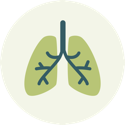Impact on Asthma
Proper asthma management includes the prevention and management of environmental triggers and adherence to medication. These measures reduce the potential for asthma symptoms and episodes. Asthma management is an important component in promoting the health and safety of a child with asthma, and ensuring that asthma does not interfere with a child’s school attendance, performance, or daily activities.
A comprehensive approach to asthma management in schools is important in managing this chronic condition. Preventing and managing environmental triggers have been covered in the other policies, either by individual trigger or in whole as school-wide environmental health and management. It is important to also address the health services component of asthma management.
Policy Guidance
Ensuring that students with asthma have an individualized health plan and access to medication is essential to successful asthma management at school. An Asthma Action Plan (AAP) is an important tool to communicate and coordinate asthma management among the health care provider, patient family, and school. A school policy that requires every student with asthma to have an Asthma Action Plan on file allows for a school nurse or other school personnel to help students with asthma and ensure that their asthma is managed appropriately — from routine daily care to dealing with triggers and worsening symptoms.
Access to medication, especially emergency medication, is very important in treating asthma episodes. Students will either carry an emergency inhaler or keep one in the nurse’s office, but it is important to have a back-up option. Passing a policy to have stock bronchodilators (a common medication to treat an asthma attack) on hand at schools is a great way to ensure that there is medication readily available in an emergency. This allows school staff to treat an asthma episode in cases when students don’t have their own inhalers.
Example Policies
School policies that promote asthma management should include a rationale, definitions, role of key players, a communication plan, and protocols for implementation.
Sample School Policy for Asthma Action Plans, American Lung Association: A sample policy mandating that all students with asthma have an Asthma Action Plan on file, and recommends where the Asthma Action Plan should be kept, plus standard procedures for how to use asthma action plans.
Model Policy for School Districts on Stock Bronchodilators, American Lung Association: Model policy, including guidance on how to implement a model policy, and how to create a protocol and procedures document when the model policy is adopted.
Best Practices
Have an Asthma Action Plan (AAP) on file for every student with asthma. The AAPs should be kept in the nurse’s office (or where medication is administered), and with appropriate teachers and staff (e.g., gym teacher). The plan outlines what the student's triggers are, what medications the student takes, and what to do in case of difficulty breathing or when symptoms worsen.
Ensure that all staff, including nurses, coaches, and faculty know about asthma, asthma triggers, and what to do in case of an asthma attack, via educational workshops or other outreach. Make sure that clear procedures are in place for contingency situations (e.g., school activities outside of the building, information for substitute teachers, and when there is no nurse in the building).
Resources & Tools
Strategies for Addressing Asthma within a Coordinated School Health Program, Centers for Disease Control and Prevention: Comprehensive six-part strategy approach to address asthma in schools.
Improving Access to Asthma Medications in Schools, American Lung Association: Comprehensive look at state-specific laws on access to asthma medication, and the importance of self-carry and other laws regarding access to asthma medication in schools.
Sample “Authorization for Administration of Inhaled Asthma Medication” Form, American Lung Association: Sample authorization form for parents/guardians to allow child to receive asthma medication at school.
Massachusetts Child Asthma Action Plan, Massachusetts Department of Public Health: Free triplicate Asthma Action Plans that can be ordered in bulk quantities.
Case Study: It Takes a Team: Clinical Asthma Management in the Classroom


